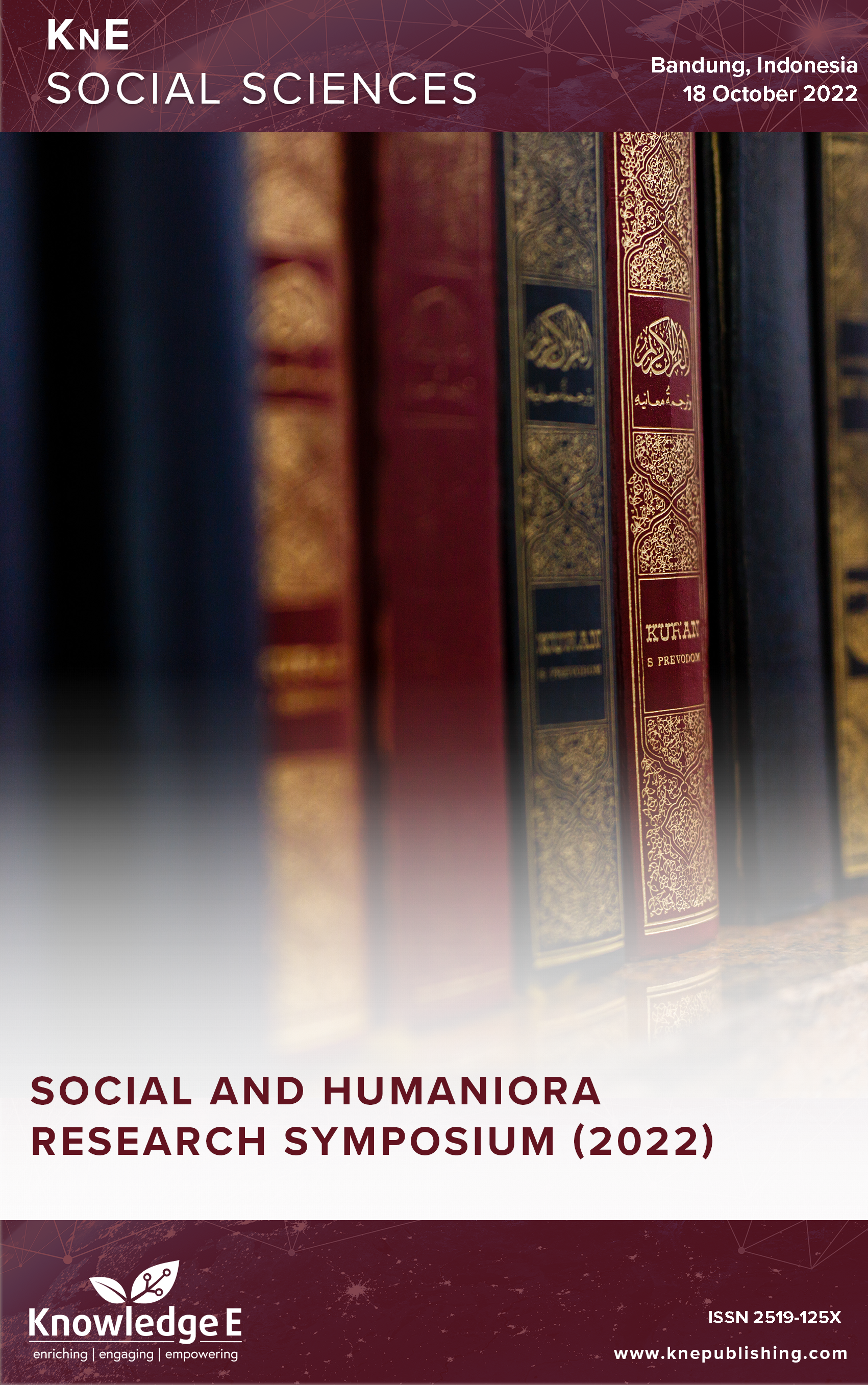Developing Digital Sociology Module Based Multicultural for Students' Learning Outcomes Improvement
DOI:
https://doi.org/10.18502/kss.v8i18.14303Abstract
This study aimed to develop a digital sociology module based on multicultural learning to enhance students’ learning outcomes. The research followed the Research and Development method using the 4D model (Define, Design, Develop, and Disseminate). The population consisted of 473 students, and the sample included 194 students and four teachers selected purposively based on their previous experience in teaching sociology with a digital module. Data were collected through questionnaires, expert validation sheets, user assessment sheets, and interviews. The results indicated that all teachers had used the digital sociology module for improving learning outcomes, but not all of them utilized enrichment materials from the government. Additionally, teachers showed interest in further developing the digital sociology module based on multicultural learning. The expert validation revealed that the digital sociology module was feasible with a very good rating. Furthermore, based on limited trials with sociology teachers and students, the prototype was deemed feasible with a very good category. A recommendation for future researchers is to maximize the learning process on a larger scale by involving a combination of schools or institutions.
Keywords: multiculturalism value, digital digital sociology module, learning outcomes improvement
References
[2] Akhiruddin, Sukmawati, Jalal, Sujarwo, Ridwan. “Inside-Outside Circle Instructional Model For Multicultural Education.” Jurnal Pendidikan dan Pengajaran. 2021;54(2):399–405. http://dx.doi.org/https://doi.org/10.23887/jpp.v54i2s
[3] Sholehhudin M, Waluyo HJ, Eko N. “Exploring the use of prose appreciation textbooks in Indonesian higher education context : The study of multiculturalism integration,” Advances in Social Science, Education and Humanities Research (ASSEHR), volume 279 Third International Conference of Arts, Language and Culture (ICALC 2018). 2018;279(Icalc 2018):366–374.
[4] Hutauruk AF, Ginting AM, Ginting AM, Ginting AM. “The utilization of history module in the development of multiculturalism-based team games tournament model to improve the bhineka attitudes on 10th grade students in SMA Erlangga Pematangsiantar,” Budapest International Research and Critics Institute-Journal. 2020;3(4):3386–3397.
[5] Supatmo, “Meneguhkan Literasi Multikultural Melalui Pendidikan Seni: Perspektif dan Urgensi Pembelajaran Seni Budaya Abad 21 di Sekolah,” 2021. [Online]. Available: http://pps.unnes.ac.id/prodi/prosiding-pascasarjana-unnes/
[6] Zhang W. Multicultural ethnic music education in Communist China. International Journal of Multicultural Education. 2017;19(3):65–84.
[7] Yao R, Zhang G, Wang Y, Bie R. Design of teaching material evaluation incentive mechanism based on Game Theory. Procedia Computer Science. 2022;202:47–54.
[8] Akhiruddin N, Khairil Ikhsan, Hasnah, Mardiah, Nursia. Khairil Ikhsan, Hasnah, Mardiah, “Penerapan Model Pembelajaran Kooperatif Tipe Jigsaw Untuk Meningkatkan Hasil Belajar Siswa di Sekolah.” Education, Language and Culture Journal. 2022;2(1):24–38.
[9] Akhiruddin R. Monika Wattimena, Andi Nursida, Salehuddin, “The role of the sociology teacher in implementing character education” International Journal of Education and Humanities. 2022;1(1):71–81.
[10] Aswat H, Tayibu KN. International Journal of Education and Humanities. 2022;1(1):82– 94.
[11] Read T. Where have all the textbooks gone?: Toward sustainable provision of teaching and learning materials in Sub-Saharan Africa. World Bank Publications; 2015.
[12] Rahman A, Ahmar AS. Development of teaching material using an Android. Global Journal of Engineering Education. 2017;19(1):72–76.
[13] Sasabone L, Jubhari Y. The implementation of English for specific purposes (ESP) in improving students speaking skill of UKI Paulus Makassar. EDULEC JOURNAL: Education, Language, Culture. 2021;1(1):1–8.
[14] Akhiruddin,Sujarwo H, Atmowardoyo NH. Belajar dan Pembelajaran. Gowa: CV. Cahaya Bintang Cemerlang, 2019.
[15] Sujarwo S, Akhiruddin A, Salemuddin MR, Sabillah BM, Sriwahyuni S. The application of problem solving reasoning (PSR) in improving students’ metacognitive at the twelfth grade students of SMAN 19 Makassar. International Journal for Educational and Vocaional Studies. 2019;1(2):138–141.
[16] Ju-sik P, Jin-han P. Development of health assessment instructional module based on problem solving learning: With priority given to stroke patients INVESTIGATION in KOREA. 2019;4(1).
[17] Sukmawati, Syam NI, Ibrahim M, Amaliah N, Sujarwo. “The lecturers’ and students’ response on independent learning-independent campus (MBKM) in teaching and learning English,” JurnalScientia.2023;12(1):10–16. [Online]. Available: http://seaninstitute.org/infor/index.php/pendidikan/article/view/1012
[18] Sugiyono S. Metode penelitian Pendidikan. Bandung: Alfabeta; 2014. [Online], Available http://perpustakaan.eka-prasetya.ac.id/index.php?p=show_detail&id=733
[19] Mills LR. G. E., & Gay, Educational research: Competencies for analysis and applications. Pearson. One Lake Street, Upper Saddle River, New Jersey 07458. 2019.
[20] Creswell JW. Research design : Qualitative, quantitative, and mixed methods approaches. 4th ed. California, United States of America: SAGE Publications, Inc.; 2014.
[21] Creswell JW. Educational research: Planning, conducting, and evaluating quantitative and qualitative research. Boston, United States of America: University of Nebraska– Lincoln; 2012.
[22] Y. S. L. Norman K. Denzin. The SAGE Handbook of Qualitative Research. California, United States of America: SAGE Publications, Inc. All; 2018. https://doi.org/10.1007/s11229-017-1319-x.
[23] Creswell JD, Creswell JW. “Research design: Qualitative, quantitative, and mixed methods approaches. Sage publications; 2017.
[24] Anderson WM, Campbell PS. Teaching music from a multicultural perspective. Multicultural perspectives in music education; 2010:1–9.
[25] Suharso R, Wasino DL. Setyowati, Utomo CB. “Teaching multiculturalism based on Islamic historical relics in Northern Java,”. International Journal of Innovation, Creativity and Change. 2020;11(10):445–463.
[26] Meyer X, Crawford BA. Teaching science as a cultural way of knowing: Merging authentic inquiry, nature of science, and multicultural strategies. Cultural Studies of Science Education. 2011;6(3):525–547.

